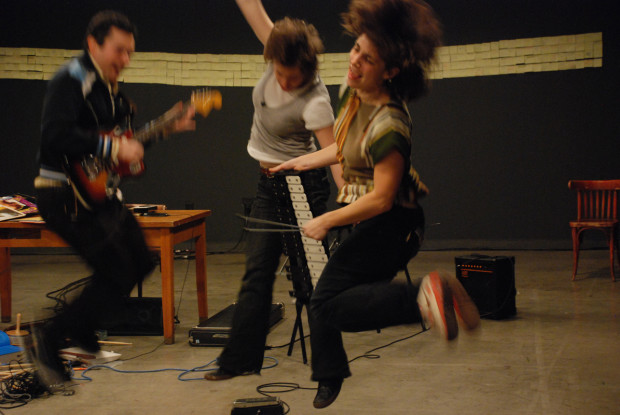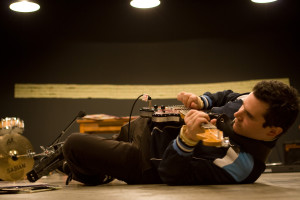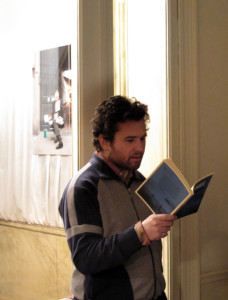“Live” performance: the search for imperfection
by Jacob Wren
Authenticity is a feeling. There is no such thing as ‘real’ authenticity. Something is authentic when we feel it to be so.
I have been making performances for almost twenty-five years. If I think back to the beginning, I recall I started because I was searching for an experience that was considerably less mediated, less passive, less alienating than watching television, movies or listening to the radio. (Experiences that, for the most part, made me feel I was living in a world I could barely relate to.) At the time I believed, or at least hoped, that performances might be an art form that provided a more immediate experience; more live, more communal, less distancing. All of these youthful desires were also tangled up with questions of authenticity.
Twenty-five years is a long time to struggle with a single question, and my feelings about performance today are considerably more complex – a complexity that, at times, verges on bitterness. My work took place in a culture that clearly preferred the experience of watching movies to that of watching performance. This may simply be because movies have considerably more resources at their disposal, the stakes are higher, and these (plus other) factors attract a more skilled/brilliant set of artists. It might also be that the most recent art form wins. Or that movies are better. (Cinema is like a dream, and in a dream nothing can hurt you.)
However, I have also come to believe that the inherent fragility, the awkwardness, the vulnerability of a live performance is an uncomfortable space in a world filled with images. In most performances I see, the artists do everything possible to armor themselves, to protect themselves from the discomfort and judgment of the audience. This is more than understandable, and is often referred to as quality or professionalism. Nonetheless, for me, trying to make a performance perfect only makes matters worse.
In my work I have instead tried to engage with performance’s inherent weakness, to embrace the always-present fragility of doing something in front of other people who are watching you, the very quality that is, in fact, what makes something ‘live’ most different from the mediated world that surrounds us.
In his book Liveness: Performance in a Mediatized Culture, Philip Auslander historically demonstrates that the term ‘live’ was never used, in the sense we understand it today, before the invention of cinema. A performance is only ‘live’ in relation to a movie. In the theatre, rehearsal is simply an earlier form of reproduction. Making a performance exactly the same every time is a trick the movies can do so much better.
Where are the artists, working on stage and off, who are willing to take the risk of leaving things open, of allowing the performance to be as different as possible each and every time we come to it anew? Of allowing themselves to be vulnerable in the face of an experience they have no absolute way of knowing will work out for the best? (These questions are directed primarily at contemporary theatre, but it also seems to me that, more and more, performance art needs to engage in a similar struggle.)
Of course, like everyone, I often prefer to watch something that ‘works’, whatever that might mean to you at different points of your life and artistic understanding. However, for me, a performance can only work if there is also some possibility that it might (at least partially) fail, if it is open to this possibility, if this is one of the ontological reasons that interests it in being a performance in the first place.
I now suspect the intimacy I was originally searching for in watching and making performances is the very intimacy I had already found in reading literature. (These days, I am also very much addicted to the internet.) Yet reading was my way of avoiding people, performance a way of bringing myself closer to others.
A performance is live when it feels live. For me, this feeling has something to do with taking an artistic risk, with avoiding the safety of over-rehearsal, avoiding a safety that often expresses itself as a desire for perfection, of asking oneself what is possible in a live-space that is simply impossible in a movie theatre (or on the internet, etc.), of not being too afraid when things go wrong, of seeing that when things go wrong it is actually only the beginning.
Jacob Wren is a writer and maker of eccentric performances. His books include: Unrehearsed Beauty, Families Are Formed Through Copulation and Revenge Fantasies of the Politically Dispossessed. As co-artistic director of Montreal-based interdisciplinary group PME-ART he has co-created the performances: En français comme en anglais, it’s easy to criticize (1998), the HOSPITALITÉ / HOSPITALITY series including Individualism Was A Mistake (2008) and The DJ Who Gave Too Much Information (2011) and Every Song I’ve Ever Written (2012). He blogs here.
He will be participating as a Team Leader in Volcano Theatre’s inFORMING CONTENT, a three-day creation lab combining an exploration of experimental approaches to theatre-making. With inspiration provided by a group of scholars giving short presentations from their various expert viewpoints, inFORMING CONTENT aims to expose young theatre-makers to forms of creation that are outside the scope of most traditional training in Canada. Click here for more information. May 3-5, 2013.





I appreciated many aspects of this post.
In particular, that the content of the writing contains the same vulnerability that it is arguing for. This is very hard to do.
Thinking about what makes a performance ‘live’, made me flash to the last time I acted in a Praxis show (Stranger). There was a scene early in the play where James Murray, who was playing Mersault, threw me a zippo from the balcony of Theatre Centre to where I was on the stage below. It was a hard catch, especially looking up into theatre lighting, and I didn’t help my cause by attempting (most of the time) an overhand snatch.
I think I was 16/18 overall during the run, which I felt pretty good about. What I liked about it was that it forced me, right from the get go, to be alive (‘live”) and live in the moment of that show everyday specifically. I remember thinking that if it was a movie, we would just film the moment over and over until I had the perfect catch, and then this perfect catch would live in perpetuity.
Because our show was “live”, this was never assured. Most audiences saw me make the catch, some didn’t. What would happen in that moment could not be assured. Hopefully moments like that add to the relevance and appeal of a live event. I know they did for me as a performer. I think they did for the audience, although it is hard to say for sure, as no one outside of the production ever mentioned the lighter catch to me…
I really love this post and I, too, particularly respond to its plea for vulnerability in performance. I have really struggled with notions of “authenticity” in performance – and in life, for that matter. I have no idea what my “authentic” self is and I always found that concept to be very deadening creatively. I don’t know if I have ever felt “authentic”. But I do understand the feeling of vulnerability. I think that this quality vulnerability in performance can come from countless approaches but certainly allowing space for failure, embarrassment and personal disclosure inside a process and a performance is key to creating immediacy and intimacy. Thank you Jacob for this reminder.
Great article.
Vulnerability inspires empathy. And empathy is the greatest tool, for me, for discovering authenticity in the rehearsal hall and onstage.
Thanks for the meaningful thoughts.
Thanks for this – nice to think about the thing we actually do.
I’ve been thinking about holding things loosely a lot- it’s a phrase the came out of I keep dropping sh#t — a solution to the, “Do we drop on purpose?” or “Do we learn never to drop?” — but it’s grown in meaning.
It’s about this liveness and vulnerability but it’s also about doing basically the same thing every night. Maybe I’m in a phase of liking stories or clear structures and more comedy. And comedy needs a kind of craft, it requires repetition and intention. But for the craft to be held loosely — to let in and accept the inevitable imperfection.
There is also a difference between training, rehearsal room and the stage. Though I’m looking for my ideal blend in those too.
I really like your thoughts Jacob. I think this invitation of vulnerability/risk is something that the performance/art world can teach us much about – where narrative structure does not seem to have such a firm hold – where the presence of the audience is necessary for the work to occur. That said, I’m also intrigued (and irritated) these days with how mediated even the live can be. We control/ mediate with rehearsal, production values, the architecture of a theatre, the ticket price.
Perhaps because I am a theatre artist primarily and am only just starting to dive into camera work, I am in awe of how the camera can invite breathtaking vulnerability – and even though it lives in a reproduced state, it can continue to feel ‘Live’ – and, in fact, WAS so very live – just not right now. There is an unconsciousness that can be captured and I think that is why so many people feel so uncomfortable in front of the camera. Walter Benjamin (can’t remember the name of the article right now) talks about how a performer can feel dehumanized in front of the camera, and yet, sometimes I think it’s the most startling revelation of humanity. Only that moment exists.
But as an audience, is the absence of the discourse that leaves us feeling alone or isolated? Or intimate? Can this dialogue continue with the artists who participated – those who made the film, those who were in it? The world of social media seems to blast this right open for us.
I loved this thread and the questions that sparked it. I agree with Jacob, that there is some writing that requires a craft and I don’t think the necessary repetition and careful shaping to do that work necessarily erases risk. One of my favourite working memories, both in the rehearsal hall and in performance, was learning an extremely fast and funny run of text in an Adam Pettle play and then playing it with Randy Hughson, right to the edge of impossible every night. If you got the right balance, we were all left breathless; the audience from laughter, us from our sprint. But it was easy to get it wrong. That was the risk we took every night and it was thrilling. I think it was like Michael’s lighter falling through the air every night. Both Michael and the audience knew every time that there was a chance he wasn’t going to catch that. They were probably just as happy with either outcome (the audience anyway, I don’t know about Michael), but either way no one was cheated of the moment of risk and the vulnerability to failure.
That said, I also agree with the fundamental proposition. “Live” in performance means much more than simply “not recorded”.
Wonderful post, Jacob.
I think the ‘liveness’ issue is perhaps more important than ever with ticket sales slumping across the theatre community. The question of what makes theatre unique and worthy of dragging people into a communal space when they can just log into Netflix is an important one. I have two thoughts:
1) I fall more toward the Peggy Phelan side of the Phelan-Auslander liveness debate. For her, performance is an ontology of disappearance. Performance happens in moments that are already disappeared, and can only exist under the necessity of vanishing. I think this is what you get at with the notion of vulnerability. Those moments of vulnerability and the unexpected is where the heart of ‘live’ performance lies… because you can never get those moments back or recreate them.
2) Even for performances that truly embrace vulnerability, I think there’s a long way to go for audiences to expect, and desire that sort of performance. Theatre has become safe, and that safety and predictability (I think) is what has driven people to film instead. Both have come to offer the same, polished, product. North America, and especially Canada, does a terrible job of educating the public about performances, and doing audience outreach. It theatre-makers want to make interesting, spontaneous, vulnerable performances, they need to bring their audience into the process. They need to be open about what the artistic process is, and offer up a chance to be a part of that process as it happens onstage. That’s one thing film can’t offer. Process.